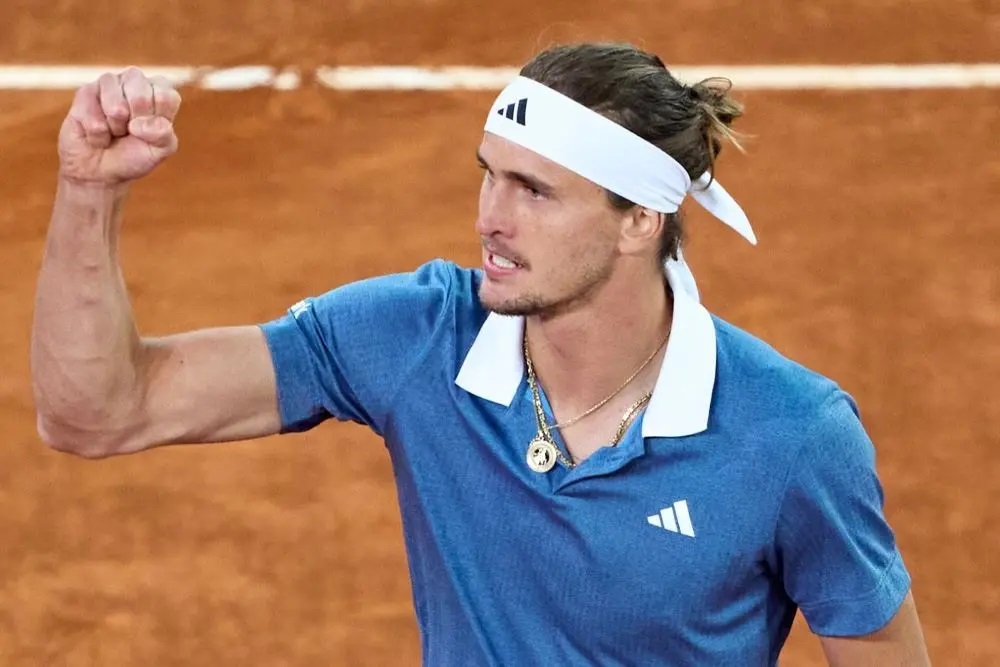In the last match of the day the No. 5 in the world comfortably seals a 64 75 win and reaches the round of 16 in the Mutua Madrid Open for his seventh time
The Madrid nocturne was poised for entertaining drama when Alexander Zverev and Denis Shapovalov stepped on court at 11 pm. The German looking to emulate his past glorious runs in Madrid, where his name is engraved in the history book as a two-time winner.
And Shapovalov, in his strenuous attempt to retrieve his pre-injury tennis and ranking standards. Let’s not forget he was a Wimbledon semi-finalist in 2021 and a top 10. And let’s not forget aesthetics, the 25-year-old being one of those players endowed with a unique, inimitably stylish leftie game.
Yet the match fell somewhat short of expectations. Too many unforced errors oozing from the Canadian, who was perpetually struggling to hold serve and just as perpetually was unable to pose a threat to Zverev’s, but for a little help in the final stages.
Yes, there were applause-ripping points, plenty enough for editing pleasing highlights, but the match was a lop-sided one, far more than is told by the score.
Shapovalov was already struggling to hold serve in the third game, when he faced two break points.
In game 5 two double faults resulted in two further break points. However, Shapovalov, mixing up power and delicacy, alias first services and dropshots. managed to emerge from trouble.
To sum up, the first 6 games had gone with serve, though Zverev had denied access, whereas Shapovalov had had to save four break points.
Zverev earned three break points in the seventh, after scything an extraordinary backhand volley on the stretch. And this time Shapovalov did not succeed in bouncing back.
A higher first serve percentage – 72%, including 7 aces – and more effective returning granted Zverev the first set. As well as a predominance in the scarce longer rallies.
Often does the wind change direction at the start of a second set, but Shapovalov insisted on overly indulging in dropshots, resulting in predictability, and lost his service in the first game.
When he faced a break point in the fifth game, after leading 40 15, it seemed as if he was about to throw in the towel. Instead he threw in a backhand passing shot, nimbly flicked with his wrist, and held on.
Back on serve – just a few minutes later, so rapidly did Zverev’s service games whizz past – he saved 5 more break points with flashes of talent, forays to the net, winning forehands from all positions.
The match seemed to be edging towards the closing credits, when Zverev was serving for the match at 54. But never write off panache in tennis. After an overall erratic performance, Shapovalov netted a forehand passing shot, which would have earned him a break point and an assumedly last chance. In turn Zverev netted a match point, suddenly tightened up and ended up dropping his serve, when Shapovalov won a humanly inexplicable rollercoaster point ultimately scooping up a ball from under the net and steering it past his opponent.
Could the plot take a different twist?
Shapovalov, who had seemed fired up after grabbing the break, abruptly deflated and disappointed expectations by losing his service to love.
Serving a second time for the match, Zverev faltered once more and faced his second break point in the match, which would have meant tie break and a leap into the unknown.
His most formidable weapon, his serve, picked up again and just in time. Three thundering first serves ushered him into the round of 16, where he will be facing Francisco Cerundolo, a resilient winner of Tommy Paul in three sets.






